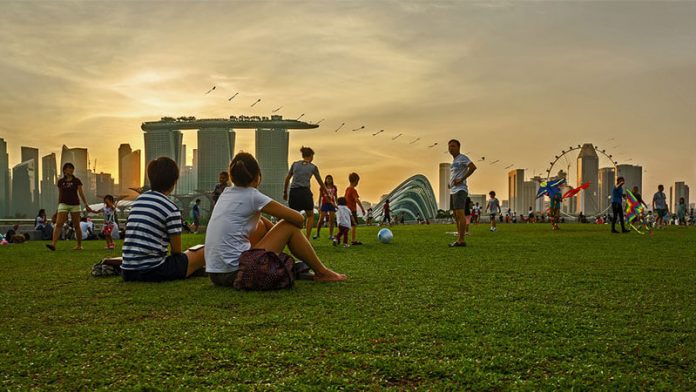Singapore rises to seventh most expensive location in Asia for expatriates
• Singapore is now the seventh most expensive location in Asia for expatriates to live, climbing above Seoul and Shanghai
• Japanese cities dominate the Asian top 10, with Tokyo overtaking Hong Kong to become the second most expensive both in Asia and globally
• Hong Kong is now the third most expensive location in Asia for expatriates to live, behind Ashgabat and Tokyo
Singapore is now the seventh most expensive location in Asia for expatriate workers to live, and 13th most expensive in the world. This was one of the findings of the latest Cost of Living survey published by ECA International, the world’s leading provider of knowledge, information and software for the management and assignment of employees around the world.
“Despite relatively low rates of low inflation and weakening global trade growth, Singapore has risen five places to be the 13th most expensive city in the world thanks to the continued strength of the Singapore dollar. Singapore is now more expensive for expatriates than Seoul and Shanghai,” said Lee Quane, Regional Director – Asia for ECA International.
ECA International has been conducting research into the cost of living for more than 45 years. It carries out two main surveys per year to help companies calculate cost of living allowances so that their employees’ spending power is protected while on international assignment. The surveys compare a basket of like-for-like consumer goods and services commonly purchased by assignees in over 480 locations worldwide. Certain living costs, such as accommodation rental, utilities, car purchases and school fees are usually covered by separate allowances. Data for these costs are collected separately and are not included in ECA’s cost of living basket.
Asia highlights
Although falling to third place in Asia, Hong Kong’s place in the rankings has remained stable this year with the city continuing to be the sixth most expensive location in the world for expatriates. Quane said, “Despite the ongoing socio-political upheavals and the fact that the economy is in recession, we have yet to see a real impact on the cost of living in the city. Inflation remains high relative to many other locations that occupy the upper reaches of our rankings. Hong Kong has only been overtaken by Tokyo due to the strong performance of the Japanese yen throughout 2019, which has moved many Japanese cities up the rankings. Furthermore, we expect prices in Japan to increase further due to the recent increase in consumption tax, and next year’s Olympics in Tokyo are likely to have further inflationary effects. As such, we expect Tokyo to remain above Hong Kong in 2020.”
Thai cities continue to be among the biggest risers in the Cost of Living rankings, with Bangkok rising 43 places and entering the top 50 most expensive locations for the first time, at 47th place. Quane said, “Bangkok, long seen as a cheap destination for holidaymakers and expatriates alike, has seen a huge jump in its rankings, moving the most out of all Asian cities surveyed. This is largely the result of a strong Thai baht. We have seen Thai cities moving significantly up the rankings over the past few years – Bangkok has moved up 75 places in the last two years alone while Chiang Mai moved up 56 places in the same period.”
Elsewhere in South East Asia, cities in Indonesia and Malaysia have risen in ECA’s rankings. Locations in Indonesia rose the fastest, largely on account of the relatively higher rate of price increases in comparison to elsewhere in the region.
In spite of recent price rises in many Chinese cities, which can be partly attributed to the impact of Swine Flu on meat prices, many Chinese cities surveyed by ECA have fallen slightly in the rankings. This is mainly due to the weakness of the yuan against major currencies in the past 12 months. “While pork prices have increased significantly in the past 12 months, the impact on the cost of living for expatriates in Chinese cities versus their peers elsewhere has been muted by the weakness of the currency”, advised Quane. “Furthermore, while pork represents a mainstay of the diet of most residents in China, it is less commonly consumed by expatriates. As such, the impact of higher pork prices is likely to have less effect on expatriates working in China.”
Global highlights
Ashgabat, the capital city of the Central Asian nation of Turkmenistan, remains the most expensive city in the world for expatriates for a second year running according to ECA’s survey. The city rocketed up from 146th place in 2017 and has remained at the top spot ever since, due to a combination of high inflation and a black market currency rate far weaker than the official exchange rate. This makes purchases particularly expensive for expatriates in their home currency unless they can access the illegal black market exchange rate. “Future living costs in Turkmenistan could potentially follow the same trajectory that we are currently seeing in Angola,” said Quane.
“The once-booming oil-based economy of the Angolan capital, Luanda, which topped the rankings in 2017’s Cost of Living survey, has continued to fall, dropping 50 places to 92nd place. Much like Turkmenistan’s declining gas exports, a decline in oil production in the country as prices fell after 2014 has contributed to a fall in the value of the kwanza, which has resulted in cheaper living costs for expatriates despite high inflation. With the currency devaluing again since the Cost of Living Survey was conducted in September, Luanda is set to fall even further down the rankings by the next survey.”
Elsewhere in Africa, Harare has seen the biggest drop in ranking, falling 159 places in a single year to 206th place. In June, the government reintroduced the Zimbabwe dollar and banned foreign currency from being used as legal tender in hopes that this would stabilise the economy. Unfortunately, the currency lost half of its value against the euro in the three months prior to the September survey period and inflation has continued to soar ever since. Middle Eastern countries have generally continued to see an increase in the cost of living, due to the strength of their currencies – many of which are tied to the US dollar.
Living costs for expatriates have particularly risen in Israeli cities, with Tel Aviv entering the top 10 for the first time in 9th place and Jerusalem sitting not far behind at 12th. Apart from Swiss cities which continue to dominate the top 10 worldwide, most European cities have fallen in the rankings since last year. Continued uncertainty over Brexit has seen London drop to 140th place – the lowest position it has occupied since ECA began producing its Cost of Living rankings in 2005. Uncertainty over Brexit was at its peak in September, with the prospect of a no-deal exit looming when the survey was carried out meaning the British pound was particularly weak against the euro and US dollar. Many European cities have dropped out of the top 100 since last year. Quane explained, “With Germany narrowly avoiding recession amid weak global demand due to the effects of the US trade war with China and Brexit uncertainty, both Berlin and Munich have dropped out of the top 100. With the Eurozone’s largest economy in the dumps, most Eurozone countries have seen a slight drop in the Cost of Living for expatriates due to the relative weakness of the euro.”
US cities have risen across the board for the second year running, as the strong performance of the US dollar continues. New York re-entered the top 20 most expensive locations for the first time since 2015, moving up to 15th from 24th last year. Honolulu also entered the top 20 in 20th place, overtaking cities previously in the top 20 including Copenhagen and Shanghai.




















